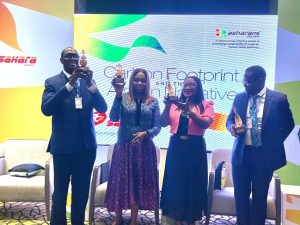Sahara Energy has unveiled its target of achieving zero carbon emissions from its oil and gas operations by 2060.

The company, along with its sister companies in the energy value chain, has commenced arrangements to reduce carbon emissions and earn carbon credits for a sustainable future.
The agenda was disclosed at a news conference, tagged, “Carbon Footprint and the African Narrative”, held by Sahara Group and Asharami Square in Lagos on Tuesday, June 25, 2024.
Mr Wole Ajeigbe, Group Project Manager, Asharami Energy, while speaking on “Decarbonisation of Africa’s Upstream Operations”, said Sahara Energy was building a sustainable energy future with an ambitious but pragmatic approach to its upstream carbon net zero journey.
According to him, efforts are ongoing at its seven oil-producing assets across Nigeria to ensure that operations at the sites are considerate of global warming.
Ajeigbe said that the net zero plan would be achieved gradually by reducing and minimising carbon emissions on a yearly basis.
He said that the company had some gas commercialisation projects which were expected to be completed by 2025 to 2026.
He listed the strategies to include elimination of gas flare across its upstream operations, reduction in freshwater usage during operation, and making use of Carbon Capture Utilisation and Storage (CCUS), among others.
Emphasising its determination, he said that the company had already joined the global group of CCUS, emerging as the first African company in the forum.
Ajeigbe said that, to ensure oil and gas continue to be used to meet Africa’s energy demands, the sector needed to decarbonise its operations quickly.
He noted that the energy demand and usage in Africa would increase significantly in coming years,
Ajeigbe stressed the need for the government to create an enabling environment that would stimulate investments and grant fiscal incentives on gas projects such as tax holidays, funding securities, risk mitigation among others.
The government and stakeholders, according to him, also need to encourage availability of capital pools; improve bankability of gas projects; give support to projects that have taken decarbonisation seriously; and attract skills and develop the capabilities needed for the energy future.
Regional Director, West Africa, Ford Foundation, Dr Chichi Aniagolu-Okoye, said although Africa was contributing about four per cent to global warming, the continent has been severely affected by the phenomenon.
She said the fact that Africa holds up to 17 per cent of the global population yet contributes just four per cent to global carbon emissions.
This, she noted, means that the continent could do more for a sustainable environment through careful and strategic planning.
Aniagolu-Okoye said that Africa must focus not only on challenges, but also on opportunities that global warming presents.
“There are numerous opportunities to place Africa firmly at the forefront of climate debate and the media should lead the campaign,” she said.
The Director, Governance and Sustainability, Sahara Group, Ms Ejiro Gray, spoke on most viable solutions for mitigating carbon emissions and meeting Africa’s development.
According to her, these solutions include natural gas development; increase in use of renewables; protection and rehabilitation of African natural carbon sinks.
She listed others to include innovation in low cost/low emissions clean energy solutions; carbon culture storage/carbon capture and re-utilisation and utilisation of domestic knowledge.
She said that Sahara had continued to make improvements to its operations, to reduce the carbon footprint and by extension, the continent footprint.
Gray listed some of the strategies to include increased use of renewables; gas commercialisation; research and development and sustainable energy and carbon sinks.
Others are Carbon Capture Usage and Storage (CCUS); tree planting initiatives; and awareness campaigns for youths, among others.
The Head, Corporate Communications, Sahara Group, Bethel Obioma, said the Asharami Square has come to stay and would be having training and mentorship for journalists.
Obioma said that it would also be having Asharami Awards to appreciate those works that had contributed to building sustainability in Africa.
He said that the body was already in partnership with University of Lagos and Pan Atlantic University in the quest to upscale skill on sustainability.
